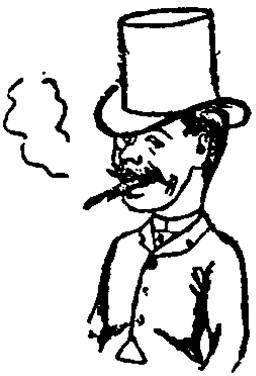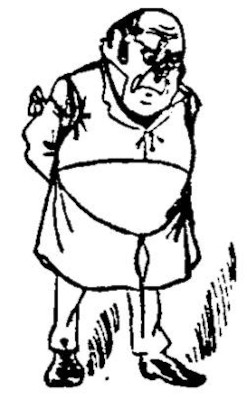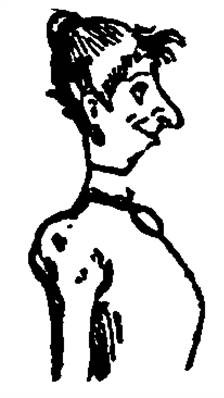This article has been transcribed from a copy of the Cardiff Times in the online collection of scanned Welsh newspapers 1804-1919 in the National Library of Wales, with grateful recognition of the free access accorded to all readers. —— David Skilton

Matter for doubt, sir, does not exist in the fact that a literary man whose personality is known may derive considerable pleasure from the encomiums of those who recognise him and his works, but the fact of one’s being thus identified has its drawbacks – and very considerable some of these drawbacks are. Fortunately for themselves the bulk of journalists write anonymously. I do fervently believe that all men start in life with the rooted idea that they could — if they tried – either write, draw, or act, and as a good many of them have never deigned to attempt to do any one of the things specified, they consider it incumbent on them to give advice and assistance to those who have. In the way of authorship, sir, what mighty things they would do, by their own account, ‘if only they sat down and started,’ to use their own expression. I have, sir, somehow, been peculiarly the victim of men with literary suggestions. Taking a sample case, we will say that I am hurrying along to one of the railway stations, having only barely sufficient time to catch a given train. Suddenly I hear a voice saying, ‘Hi, hi, Samuel, just the man I wanted to see. I've got a rattling good thing to tell you.’ I am not of the order of men, sir, who can roughly tear themselves away from a bore, be he ever so prosy, so I fall a victim to the snare held out for me.

'Funny, wasn't it?
My tormentor will seize hold of the collar of my coat, and will then pour into my ear a story of which I can make positively nothing. Meanwhile I theatrically affect an air of deep interest, and say ‘Yes’ and ‘No’ at stated points in the narrative, though candour compels me to say that I very absently say ‘No’ when I ought to say ‘Yes,’ and vice versa. I know full well that I have missed my train, and that I shall be put to grievous inconvenience in consequence, but an exaggerated sense of politeness impels me to go on affecting to listen. Naturally, my prompter laughs very heartily at his own anecdote, and ventures the remark that it is the ‘funniest thing he ever heard,’ and then of course I am compelled to laugh in a hollow, sickly fashion also. ‘You perfectly understand the point, don't you?’ he says. ‘Certainly, certainly; splendid!’ say I, with a most reprehensible want of candour; ‘make a glorious paragraph.’ ‘I thought it would suit you,’ says he, with a self-satisfied sort of air which seems to imply that I am under a deep personal obligation to him.

'Just Tell the Public what I'm doing, and you'll Sell the Paper like One O'Clock.'
And I have to avoid the man afterwards; I have to run down side streets when I see him approaching, for I know what he will say, sir. I know that he will look exceedingly injured, as though I had robbed him of something, and then he will say reproachfully that he had taken in seven numbers of the paper, ‘regular,’ and that he has failed to see the pearl of wit he had conveyed to me. His discomfiture generally arises from the fact that he has told a large circle of friends that he is the author of a striking item, and when these remark to him somewhat significantly that they haven't seen it in, he naturally feels annoyed and chagrined. Sometimes a strongly malicious or self-interested motive underlies our friend's communicativeness; he has a story that redounds (according to his version of it) greatly to his credit, or he wants his business advertising. In this latter case, he tells you his anecdote first, and then he remarks, in quite an off-hand sort of way, ‘Oh, by the way, old man, you might just work in a word or two about our new shop front. You needn't say too much, you know; just put it in that it's about the finest thing in Wales, and that we have got an entirely new stock of goods in.’ You make an enemy of that man, sir, unless you comply with his request, and he subsequently ventures the opinion to a mutual friend that you are not a ‘good sort.

'It was this way, you know. Well, some years ago, &c.'
The malicious man generally has some story to relate which deals with the good name of a neighbour. He either boldly asserts that he wants to have what he calls a ‘wipe’ or a ‘rap’ at the individual in question, or he tries to do the thing in a covert sort of way by suggesting to you that you should ask in a paragraph who the ‘married’ man, living in so[-]and-so, is who recently walked out with the daughter of his next door neighbour, and upon whom all the street cried ‘shame’ (this is the inevitable formula) in consequence. Sometimes this personage is most persistent in his attentions. He will call upon you every day for a month to know how it is that you haven't made use of the materials he has provided. If you explain to him that his matter is the sort of thing no respectable journal would publish, and that it is, moreover, distinctly libellous, he will, in the most unselfish way in the world, instantly back out and say that he would not have his name mentioned as your informant for all the world, but that, of course, if you are willing to publish his statement on your own responsibility, you are at liberty to do so.

The Pretty Talker
Then, sir, I must not fail to speak of the man of the mysterious manner who is such a bugbear to such as myself. He rushes breathlessly up to one and says, in an eager sort of way, ‘You haven't heard about that affair in Blank-street, have you?[‘] Possibly you say ‘No.’ ‘Well,’ says he, ‘I'm not at liberty to tell you anything; you mustn't mix me up in it; it's a very funny affair altogether; you had better make enquiries; it will make a hit, I can tell you,’ and before you have time to ask for any sort of information, he winks knowingly and rushes off. Should you, with true journalistic perseverance, inquire into the matter to which he refers, you, in nine cases out of ten, discover that it is some affair of the most trivial nature, but, like all his clan, when you next see him, he says somewhat bitterly, ‘You didn't use that grand bit I told you about.’ Oh, the hours I have wasted in listening to the vapourings of possibly well-intentioned people, who thirsted to give me information which, had I used it, would long since have consigned me to the gaol, the asylum, or the cemetery. Many a time and oft [Merchant of Venice I.iii.105] have I been kept in the rain, courting rheumatic fever and watching the gradual shrinking of my newest suit, whilst some well-mackintoshed umbrella-ed and goloshed scandal-monger has been relating his experiences, embellishing his anecdote by an infinitude of such superfluous phrases as ‘Well, said I,’ ‘And what do you think?’ ‘Was I to stand that?’ ‘But I must go back a bit,' ‘But better than that,’ ‘As it were,’ and ‘Now listen.’ Such men have kept me, sir, shivering on the doorstep late at night; they have told me stories unfit for publication, and then bounced off with a chuckle, exclaiming triumphantly, ‘Now Sammy (I hate to be called [‘]Sammy’ ) ‘go and publish that!’ It is the mission of the ladies to talk, as I daresay you may have chanced to have heard, sir, and were I a bachelor I should soon stop their mouths in the most effective way (you know, go along) — that is if they were pretty and all that sort of thing.
'He followed me for quite a mile.'
But I am not a bachelor, sir, and I know it some. So I have to listen, impatiently scraping my feet, and saying at intervals, ‘Dear me,’ ‘How nice,’ [‘]I quite agree with you,’ and so on. The lady in the picture – I mean the lady who has not got a hat on — only the other day assured me that I ought to redress her wrongs in the press, seeing that a ‘nasty, impudent fellow’ had followed her for quite a mile, after he had first remarked, ‘It's a nice night to-night, Miss.’ I said I would do her the fullest justice if she would, to prove her bona fides, allow me to publish her honoured name. That bottled her up, sir. Perhaps it was wrong to spare the man, sir, but a fellow with such taste could not have had his feelings injured by anything. Then there is the good-natured, self-satisfied person who assures me that he knows what would go; if he only set to work, he could 'liven 'em’ up. According to him, your articles want ‘a bit more spirit in 'em,’ or they bite too hard, and are too savage, or they are too short or too long, or too something or other. And to some of those self-constituted prompters the oldest and most pre-Adamite ‘wheeze’ is a thing that is ‘awfully good, you know,’ a thing they have just heard and have been saving up for you. Of course, they don't want any payment for relating it to you; if you can make a couple of guineas or so out of it you are welcome to do so — when you can get it.

’Good enough for “Punch”, isn’t it?'
They thought of sending it to Punch, but they considered that they might do you a bit of good by keeping it for you, so of course you can have it. As they have never heard it before, they instantly conclude that it is quite new and original. Most of them tell such an old, tame, crusted, antediluvian joke as though the incidents thereof had come under their own personal cognizance. When you remind them that the story was published somewhere about the beginning of the last century, they regard you as offensive, and set down your statement as one dictated by an envious spirit of detraction. The same rule applies in an even stronger degree to the people who suggest pictures and cartoons. They begin by saying with an air of great determination, ‘Oh, if I could only draw, I'd show 'em,’ and then they go on to explain what they would draw. And it is this sort of thing, sir, that a jaded brain worker has to endure.
Last modified 8 May 2022